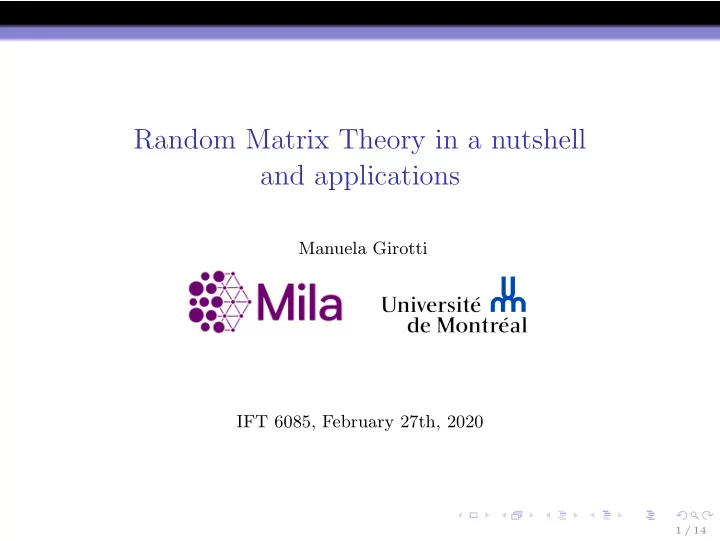

Random Matrix Theory in a nutshell and applications Manuela Girotti IFT 6085, February 27th, 2020 1 / 14
Random Matrix Theory Consider a matrix A : a 11 a 12 a 13 . . . . . . a 1 N a 21 a 22 a 23 . . . a 2 N a 31 . . . . . . A = . . . . . . a M 1 a N 2 . . . a MN 2 / 14
where the entries are random numbers: . . . . . . ∗ ∗ ∗ ∗ . . . ∗ ∗ ∗ ∗ . . . ∗ . . . A = . . . . . . . . . ∗ ∗ ∗ where ∗ = (Gaussian distribution, e.g.) 3 / 14
A few questions: What about the eigenvalues? x_1 x_2 x_3 x_n ... Their (probable) positions will depend upon the probability distribution of the entries of the matrix in a non-trivial way. There are different statistical quantities that one may study (-discrete- spectral density, gap probability, spacing, etc.) 4 / 14
What if we consider BIG matrices, possibly of ∞ dimension (appropriately rescaled)? Figure: Realization of the eigenvalues of a GUE matrix of dimension n = 20 , 50 , 100. 5 / 14
Figure: Histograms of the eigenvalues of GUE matrices as the size of the matrix increases. 6 / 14
Figure: Histograms of the eigenvalues of GUE matrices as the size of the matrix increases. 7 / 14
Figure: Histogram of the eigenvalues of Wishart matrices as the size of the matrix increases (here c = p/n ). 8 / 14
Applications Nuclear Physics (distribution of the energy levels of highly excited states of heavy nuclei, say uranium 92 U ) 9 / 14
Applications Wireless communications 10 / 14
Applications Finance (stock markets, investment strategies) 11 / 14
Applications Very helpful in ML! Figure: The histogram of the eigenvalues of the gradient covariance matrix � ∇L i ∇L T 1 i for a Resnet-32 with (left) and without (right) BN after 9 k n training steps. (from Ghorbani et al. , 2019) 12 / 14
Thanks for your attention! “ Unfortunately, no one can be told what the Matrix is. You have to see it for yourself.” (Morpheus, “The Matrix” movie) 13 / 14
Recommend
More recommend